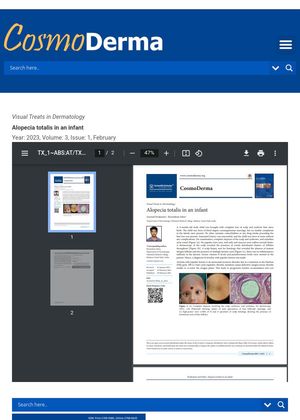Alopecia Totalis in an Infant
February 2023
in “
Cosmoderma
”

TLDR An infant with complete hair loss was diagnosed with a genetic disorder affecting hair growth.
The document discusses a case of a 4-month-old male infant who had complete loss of scalp, eyebrow, and eyelash hair since birth. The child was born of a third-degree consanguineous marriage, with no similar complaints in the family. No other systemic comorbidities or drug intake preceding the hair loss was present. A dermoscopy of the scalp revealed evenly distributed clusters of follicles, and a scalp biopsy showed the absence of mature telogen follicles and the presence of multiple keratin cysts. The patient was diagnosed with atrichia with papular lesions, an autosomal recessive disorder due to a mutation in the Hairless (HR) gene. This mutation causes defective catagen arrest, leading to progressive keratin accumulation and cyst formation. The document suggests that biochemical parameters and gene studies for HR mutation can confirm the diagnosis, but gene studies were not done in this case due to affordability issues.




